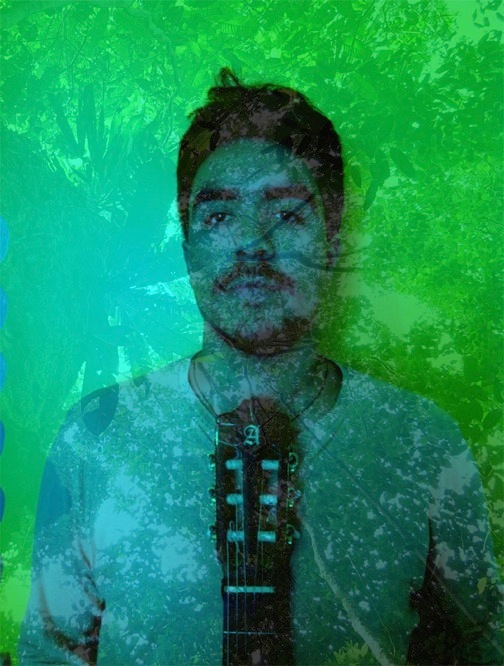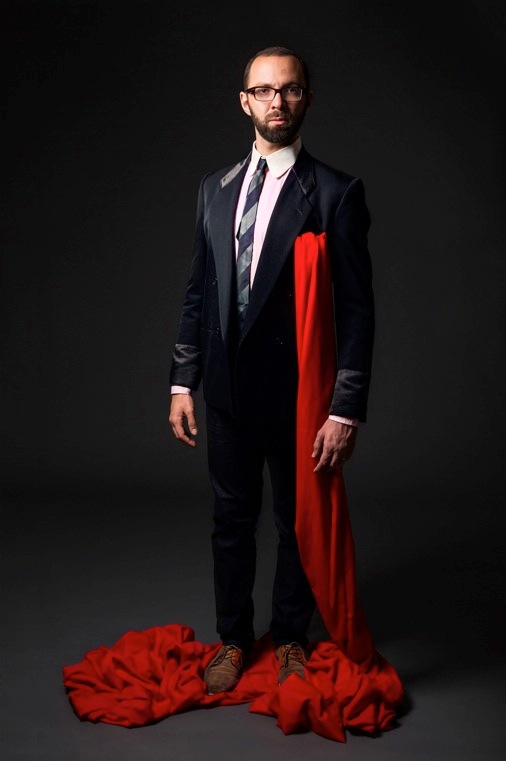Jan
12
with Betty Bonifassi, Karsh Kale, Emel Mathlouthi, Daniel Marques – Rodrigo Ursaia Duo, Fernando Vilela, Thiago Thiago de Melo, Thiago Amud, Sergio Krakowski – Talking Drum Project, Pedro Sá Moraes & many more
Mon January 12th, 2015
6:00PM
Main Space
Minimum Age: 18+
Doors Open: 5:00PM
Show Time: 6:00PM
Event Ticket: $15
Day of Show: $20
free for members
Brazilian Explorative Sessions:
What new paths are being blazed in the realm of Brazilian music? In what ways the tradition of musical innovation that became known to the world between the 50’s and 70’s is still bearing fruit in new generations of Brazilian creators? Featuring singers/songwriters/instrumentalists Pedro Sá Moraes, Thiago Amud, Thiago Thiago de Melo, Sergio Krakowski and Fernando Vilela, plus the Eco electro-acoustic-jazz project (synthesist/composer Ivo Senra and drummer Lucio Vieira) and the contemporary guitar-flute duo Daniel Marques – Rodrigo Ursaia, the Brazilian Explorative Music showcase reaches its fourth year on January 12th at the eclectic stage of Le Poisson Rouge.
Here’s what NY Times’ Jon Pareles had to say about the last edition of the “Explorative” showcase: “Brazilian popular music has few rivals anywhere for structural sophistication. That hasn’t prevented at least one cabal of experimenters from setting out to add even more intricacies. On Monday night, the third annual “Brazilian Explorative Music,” a concert organized and headlined by the songwriter Pedro Sá Moraes, brought all the members of Coletivo Chama (the Flame Collective) to S.O.B.’s. They brandished advanced ways to construct, dismantle and sometimes disrupt a piece. The performers — a coterie of similarly minded musicians — didn’t abandon their Brazilian birthright: the trove of regional rhythms, the sinuous chromatic harmonies, the appreciation of poetic imagery and wordplay, the long-lined melodies. Instead, they pushed harder on each parameter. In many ways, the musicians are extrapolating the heritage of tropicália, the 1960s movement that self-consciously and wittily modernized Brazilian pop.”
Set times (*tentative and subject to change)
6:30 – Daniel Marques – Rodrigo Ursaia Duo – “Espantalho” CD Release
7:00 – Fernando Vilela – feat. Pablo de Sá (cello) and Cintia Graton (vocals)
7:25 – Eco – Lucio Vieira and Ivo Senra Duo
7:50 – Thiago Thiago de Melo
8:15 – Thiago Amud
8:40 – Sergio Krakowski – Talking Drum Project
9:00 – Pedro Sá Moraes
FREE with APAP badge
This is a general admission, standing event.
This event will be streamed live online through LPR’s streaming channel, beginning at 6pm.
1
5
8
11
Puerto Candelaria

Founded in 2000 in Medellin, Colombia, Puerto Candelaria bases its sound in popular Colombian rhythms, full of imagination and magical spirit. With their creation of contradictory rhythms like Cumbia Underground or Jazz a lo Colombiano they were able to create a special place for their country in the global markets of jazz, experimental, and world music.
In its 14-year history, Puerto Candelaria has recorded 4 albums and a DVD rich in both local and international sounds. More than a million people have attended Puerto Candelaria’s concerts during 30 international tours that have taken the band to more than 60 cities in Central America, South America, Europe, and Asia.
The Candelarios captivate their audience with their experimental sounds in joyful shows that explore the absurd in everyday matters through laughter and transcendent emotions, along with rhythm, dance, and most importantly, the exuberant explosion of Colombia’s cultural richness.
“an explosive danceable cocktail where different urban sounds mix in a blend of cumbia and atmosphere from the Colombian coast” ~ Telam Argentina
Puerto Candelaria official site
Puerto Candelaria on Facebook
Betty Bonifassi
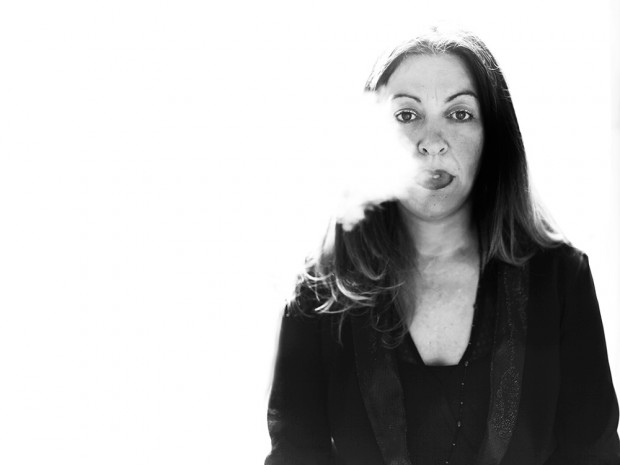
Renowned for the warm, powerful voice identified as the heart of Les Triplettes de Belleville, DJ Champion and Beast, Betty Bonifassi returns solo to present her incredibly lively, swinging first eponym album, a tribute to black songs from the ‘20s—songs from prisons, forced labour camps, the railroad and field calls—born of the need to survive often inhuman working conditions. Goose bumps guaranteed!
Karsh Kale
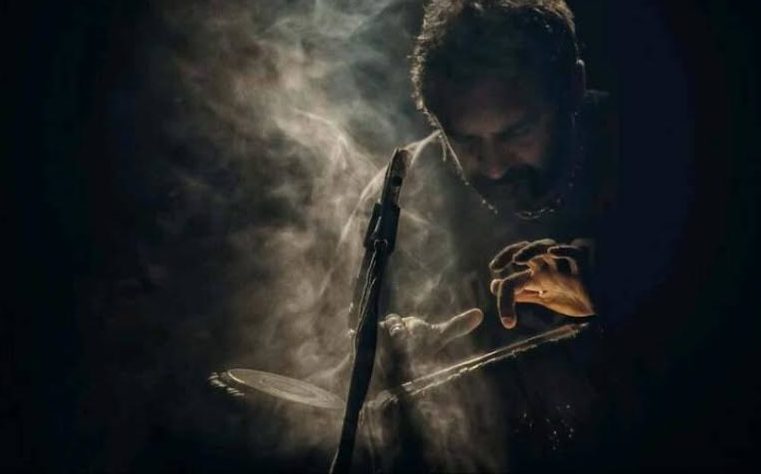
Described by Billboard Magazine as a “visionary composer and producer”, Karsh Kale is one of global music’s brightest stars. In the past 12 years as a solo recording artist, producer, composer, live performer and DJ, Karsh has set the world of electronic fusion on fire and has helped to create a genre of new music and culture that continues to influence an entire generation. His body of work has been cause for fans and critics alike to claim Kale as a pioneer and a trail blazer, not only opening doors for his own career but for an entire scene to emerge in the world of electronica and fusion music. Karsh Kale has also developed a reputation as a genre bending collaborator and a world renowned tabla player and musician, exploring the worlds of electronica, Indian classical music, rock, jazz fusion and hip hop which has led him to work with some of the most renowned artists from around the globe. Kale continues to reinvent his ever-evolving sound and has established himself as one of the worlds most sought after fusion artists.
Emel Mathlouthi
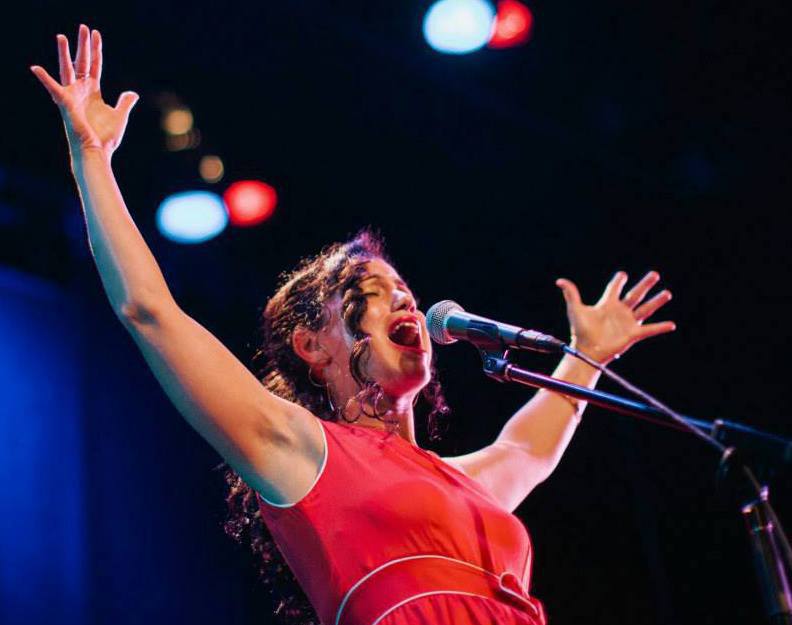
Prominent Tunisian Singer/Songwriter Emel returns with Ensen, out now.
From her home in New York Emel reaches for the international stage with Ensen, an album recorded in seven countries with numerous producers including Valgeir Sigurðsson (Sigur Ros).
Emel’s first album, Kelmti Horra (My Word is Free), introduced her groundbreaking marriage of sounds steeped in Tunisian rhythms and electronic beats. On Ensen, she’s developed a style that’s even more uniquely her own, combining organic and electronic sounds to produce a record that will appeal to any lover of innovative and heartfelt music. “It took a couple of years to realize the visions that were popping up inside me,” Emel says. “I faced resistance from people wanting to keep me confined to an ‘ethnic box’ and trying to limit my creative freedom.”
Despite government censorship in Tunisia, Emel found relief and strength in the music of Baez, Dylan, Lennon, Pink Floyd and Led Zeppelin—she even formed her own metal band while at university. She soon became known on the Tunisian alternative scene for her protest songs, “little by little, more and more people started coming to my shows, telling me my words were a relief — but I knew I’d never get anywhere in Tunisia, no matter how talented I was.”
After saving money from gigs, Emel moved to France in 2008 and developed an international following through social media. During the Tunisian Revolution in 2011, her song “Kelmti Horra (My Word Is Free/written in 2007)” reached millions of views on Youtube and eventually became the anthem for the Arab Spring.
“While the songs on my first album, Kelmti Horra (My Word Is Free), developed on stage over a six-year period, Ensen is a fully realized studio album. Producing it was a process of soul searching and liberating musical experimentation. I was looking for a deeper, limitless way of expressing myself.”
With her main collaborator, French/Tunisian producer and physicist Amine Metani, Emel shaped an album of expansive soundscapes. She recorded Ensen in seven countries across three continents, with several additional producers including Valgeir Sigurðsson (Sigur Ros, Bjork) and Johannes Berglund (The Knife, Shout Out Louds, Ane Brun).
“We initially recorded acoustic takes of the songs using piano, guitars and Tunisian style drumming. I then had the idea of create my own library of electronic beats by running percussion and recorded sounds through several homemade setups. Then we added in analog keyboards, mixers, effects and distortion, and the result sounded nothing like anything we’d ever heard before.”
The team’s production approach brought out the cinematic side of Emel’s music, also inspired by the dramatic electronic music of Forest Swords, Samaris, Ben Frost, and James Blake. “Ensen Dhaif (Helpless Human),” the title track, is propelled by sparkling gumbri (a Tunisian three-stringed big bass lute used in Gnawa music), feverish zukra (Tunisian flute), trance-inducing bendirs (North African frame drums), and heavy kick drum. “The lyrics call to disobedience when the oppression of social injustices run so deep.” Pulsing gamelan gongs and North African percussion introduce “Layem,” a song about the plight of the homeless. Emel’s vocals are full of restrained emotion as the song builds to a finish, awash with rich, distorted synthesizer textures.
“Fi Kolli Yawmen” has solemn echoes of church music as it follows Emel’s freely improvised vocal line over a horizon of organs and synthesizers. Flutes and gumbri give “Thamlaton (Drunkeness)” a funky feel, a song that combines Iraqi dabke with industrial rhythms, and Emel’s wild vocals.
“It’s contemporary abstract prose: Where are we? What are we doing? What the hell is going on inside us? It’s like the flesh and the body collapse in the form of interior anarchy, to raging states that we don’t yet know… it’s almost erotic.”
Emel will tour to support the record, but her concerts go far beyond the sounds on the album. “I never perform the same way twice. I am more of a theatre person than a studio artist; the songs take on multiple lives once the recording is done. I’m very free with my vocals. I often take unexpected, spontaneous paths with the feel of the moment.”
Daniel Marques – Rodrigo Ursaia Duo

Daniel Marques – Rodrigo Ursaia Duo – “Espantalho” CD Release
After touring Europe together for two consecutive years, Daniel Marques (7 string guitar) and Rodrigo Ursaia (sax / flute) registered their friendship and musical affinity in an new album presenting all original material. The new CD features 8 songs composed by Daniel and arranged by the Duo. Brazilian rhythms are explored in a venturesome and virtuousic way: frevo, bossa, choro, forró, samba and a tune called “War Suite” in three movements honoring the painter Candido Portinari.
The young guitarist, who’s now based in Berlin, where he teaches at the “Global Music Academy”, was the winner of the 2010 Brazilian Music Award (the “Brazilian Grammy”) as an orchestra arranger and producer. As a soloist, he’s been maintaining a very intense European tour schedule, covering regularly, since 2008, over a dozen countries, with appearances at many of the top guitar and jazz festivals and venues in Europe, such as the Mir Guitar Festival, Uppsalla Guitar Festival, Art Guitar Festival, Haapavesi Folk, Tallinna Guitar Fest, Nisville Jazz etc. Rodrigo Ursaia is widely regarded as one of Brazil’s top saxophonists and flutists, having made a musical career for himself in his native Brazil and in NY, where he lived for over a decade, playing and recording with the likes of Rosa Passos, Ivan Lins, Toninho Horta etc.
“Daniel Marques is one of those artists that you run into once in a while and you just go: ‘Wow! Where this guy come from?’” (American Grammy board Niels Lan Dokky)
“Outstanding!” – Lionel Loueke, guitarist with Herbie Hancock (Benin/USA)
Fernando Vilela
Born in Rio de Janeiro, Fernando Vilela’s music seems far from the shoreside luminosity of the “Wonderful City”, but rather it pulsates with the endless ridges of his parents homeland — the state of Minas Geraes, which gave the world masters like Milton Nascimento and Toninho Horta. Graduated in Psychology and Drama, Vilela started his musical career composing and performing soundtracks for tens of local theater productiona. In 2013 he released his first solo album as a songwriter – Quadro – enmeshing his winding and lyrical melodies with the baroque, at times gleeful, at others desperate arrangements by Thiago Amud.
Antonio Carlos Miguel, arguably one of the most important critics of brazilian music, has said of the CD: “It’s a surprise, way ahead of the curve. There are echoes of the 60’s and 70’s, some of the stylistic freedom of Milton Nascimento and his encompassing Clube da Esquina, also advances on the path of Jobim and Villa Lobos, but it’s very far from mere copy. It’s contemporary music with identity!”
Thiago Thiago de Melo
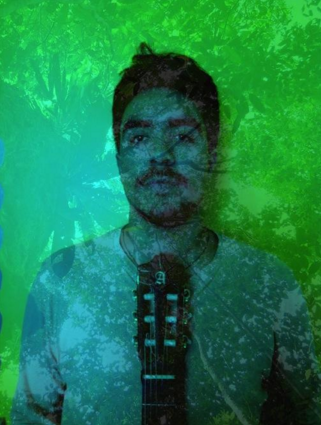
Thiago Thiago de Melo is the torchbearer of an artistic dynasty that flows from the heart of the Amazon rainforest to the shores of Rio de Janeiro. Son of the amazonian Thiago de Melo, one of the most revered brazilian poets alive, younger brother of the late Manduka, one of the greatest hidden gems of brazilian music, Thiago Thiago is also the nephew of late Gaudêncio Thiago de Melo, founder of the ONU guitar society and leader of the world music pioneer Amazon Band. And he does not veer from his inherited mission and trade. Lead vocalist to Rio based rock fusion Escambo band, that “merge expansive melodies with math-rock curiosities” (Jon Pareles – NY Times) the songwriter “combines Brazil’s rich literary traditions and African-inspired rhythms, such as samba, forró and pagode, with jazz, rock and electronica”. (Tim Wilkins – WBGO)
In parallel with his musical career, Thiago has pursued a Phd in Anthropology, dedicated to the study of renovation in contemporary MPB (Brazilian Popular Music). It was during the research for his thesis that he became close to several of the artists who later became the core of Coletivo Chama.
Thiago Amud

Thiago Amud is a Brazilian songwriter, arranger, singer and guitarist. He is a frequent co-writer with Brazilian songmasters Guinga and Francis Hime, and has had some of his songs interpreted by legends such as Milton Nascimento and Alcione, among others. The poetic rigor of his lyrics, the unpredictability of his tunes and harmonies, the way he combines several Brazilian rhythms and a kind of cinematic character of his arrangements have drawn the attention of the critics to his work. His second album “De ponta a ponta tudo é praia palma” was hailed, in a full cover page story in the cultural supplement of Rio’s main newspaper (O Globo) as a prodigy, “defying established truths, such as the one that you can no longer be ambitious in popular music”. It was elected by the same newspaper as one of the top ten best albums of the year.
North American press has also been acknowledging Amud’s innovative songwriting. On last January’s piece about the Brazilian Explorative Music showcase, NY Times’ Jon Pareles took an impressed note of his lyrics, “full of absurdist juxtapositions and brutal imagery”. “His guitar playing”, he said, “was a thorny counterpoint to his voice, and his songs kept shifting meter, jumping in and out of typical dance rhythms. He’s a clandestine radical.”
Sergio Krakowski – Talking Drum Project
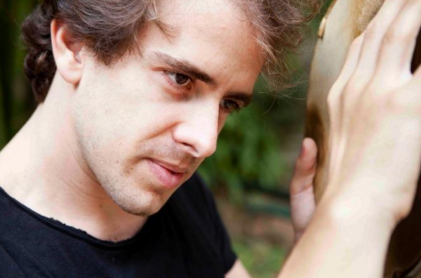
Talking Drums is a multi-media project by Sergio Krakowski that brakes new ground in the realm of solo percussion expression. After developing his own self-taught technique on the Pandeiro (brazilian tambourine) and engaging himself in a successful international career, sharing the stage with the likes of Maria Bethânia, Gonzalo Rubalcaba, Tigran Hamasyan, Lenine, Chico César, David Linx, Chano Domínguez, Maria João, Mario Laginha, Yamandú Costa and countless others, Sergio plunged in the application of his knowledge acquired in a Computer Music PhD to allow percussion instruments to trigger videos, control effects and interact with the machine, creating real time dialogs between percussionist and computer.
The prpject has been presented in a miriad of stages such as the Guggenheim Museum of Bilbao, The Stone (as guest of Cyro Baptista), Drom, (Le) Poisson Rouge (three times) and Circo Voador, in Rio de Janeiro.
In the Talking Drums project, Sergio uses technology to actually make the drum speak. Behind this idea there is a strong artistic research on what is the limit between rhythm and spoken language that takes us to ancient times where the distance between these two things was smaller or inexistent.
Sergio Krakowski official site
Pedro Sá Moraes
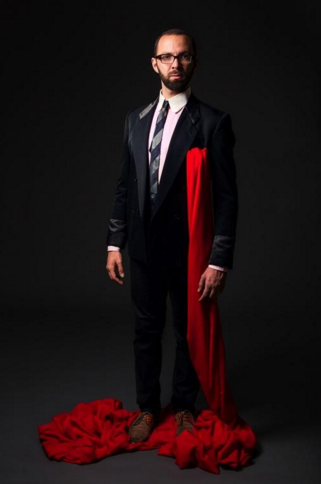
“Guitarist and singer Pedro Sá Moraes is a great introduction to Rio de Janeiro’s adventurous music scene. At turns rocking and lyrical, Moraes demonstrates his ability to mine Brazil’s rich musical veins and turn traditional rhythms and forms on their heads” – Tim Wilkins (NPR.org)
Sá Moraes pitted rough and smooth against each other in songs from his album, “Além do Princípio do Prazer”. His melodies, sung in a warmly sustained baritone with echoes of Gilberto Gil, were the smooth aspect. But they were set in contentious arrangements: with noisily scrabbling guitar, sudden drum interruptions or choppy meter shifts that made the melodies sound even stronger for withstanding the attacks.” – Jon Pareles (New York Times)
Recently featured on NPR’s “10 artists you should have known last year”, the Rio born singer/songwriter presents songs from his latest CD – “Além do Princípio do Prazer” – “Beyond the Pleasure Principle”.
After touring Brazil extensively since 2003, the artist started consolidating an international career, with tours to Europe, Asia, North and Latin America. Since 2010 he is often watched live in the US, performing in festivals such as the Chicago World Music, Brazil Summerfest (NYC), SXSW (Austin), Philadelphia Film and Music Festival and others, as well as in clubs such as Yoshi’s (San Francisco), MOMO’s (Austin), Joe’s Pub, Zinc Bar, Drom, Nublu, SOB’s and Le Poisson Rouge (NYC), The Blue Whale and Key Club (LA) and Performing Art Centers, such as the Old Town School of Folk Music (Chicago).
His first album, Claroescuro (Lightdark), was released in 2010 by Austin Based Caravan Music, and was acclaimed by press outlets such as NatGEO Music, NPR and the Boston Globe, which featured it amongst the ten best World Music CD’s of 2010.
Pedro Sá Moraes official site
many more



